Report: Employability Skills and Management in Travelodge
VerifiedAdded on 2020/12/10
|19
|6575
|329
Report
AI Summary
This report provides a comprehensive analysis of employability skills within Travelodge Hotels Limited. It begins by outlining the responsibilities and performance objectives of a manager, including direct and indirect relationships, decision-making, employment legislations, and ethical considerations. The report then assesses the effectiveness of these objectives, highlighting the importance of individual appraisal systems, time management, and employee motivation. Recommendations for improvement focus on the effective use of appraisal systems and rating methods to enhance employee performance and sales. The report also explores motivational techniques, both financial and non-financial, and discusses solutions to work-based issues, such as employee retention and cultural differences. It emphasizes problem analysis, research, and the development of strategies for resolving issues like labor turnover, ultimately aiming to improve the overall performance and success of the hotel.
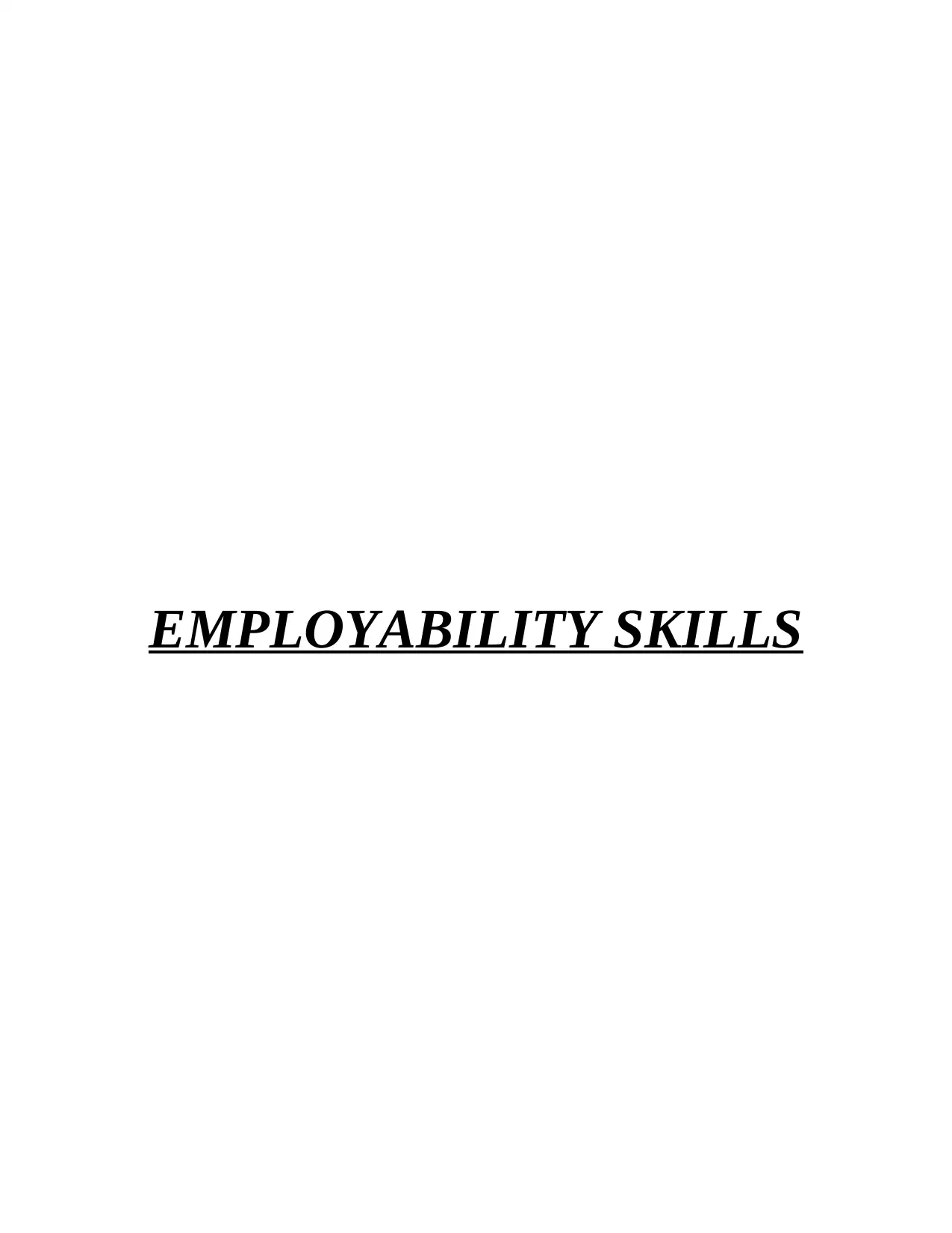
EMPLOYABILITY SKILLS
Paraphrase This Document
Need a fresh take? Get an instant paraphrase of this document with our AI Paraphraser
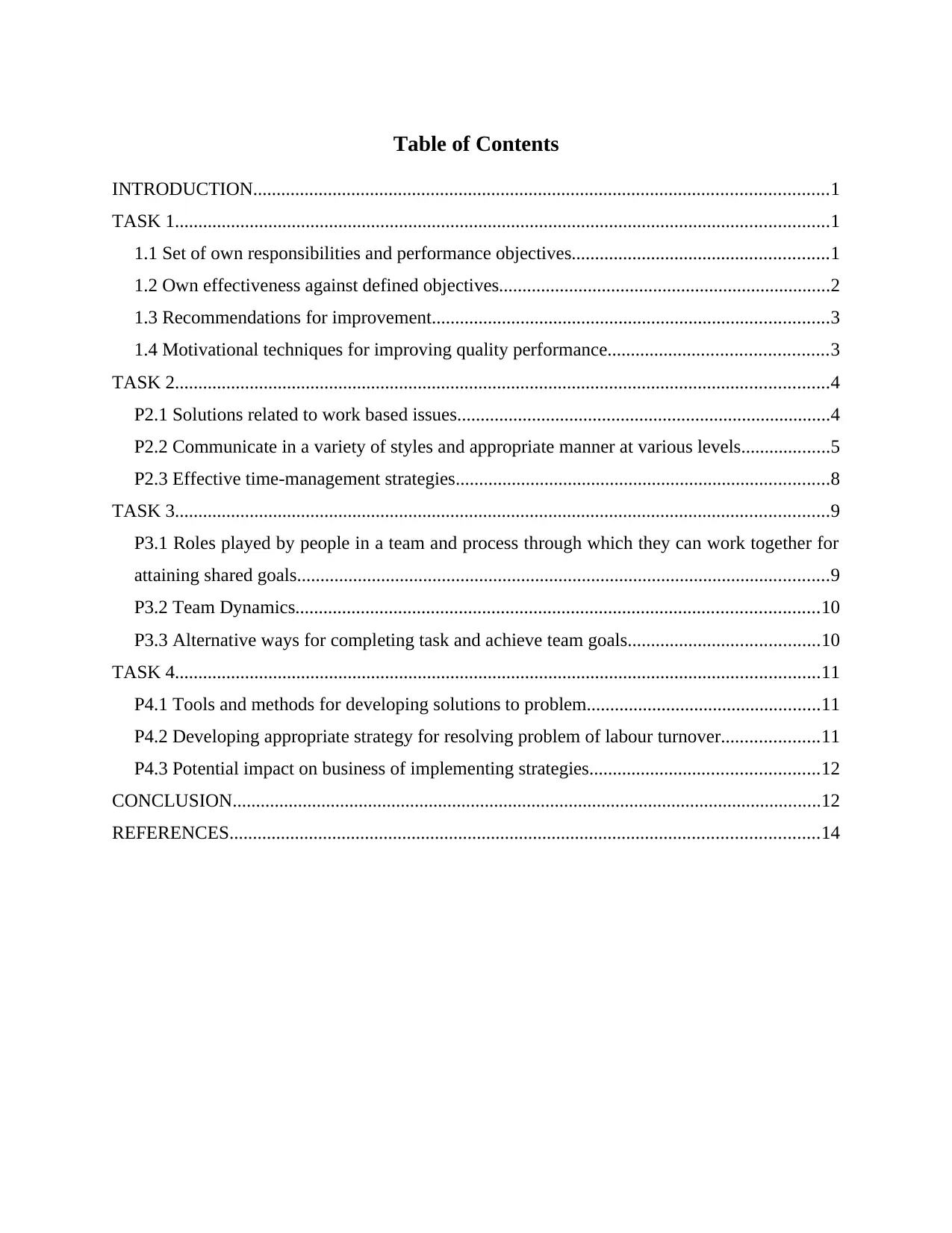
Table of Contents
INTRODUCTION...........................................................................................................................1
TASK 1............................................................................................................................................1
1.1 Set of own responsibilities and performance objectives.......................................................1
1.2 Own effectiveness against defined objectives.......................................................................2
1.3 Recommendations for improvement.....................................................................................3
1.4 Motivational techniques for improving quality performance...............................................3
TASK 2............................................................................................................................................4
P2.1 Solutions related to work based issues................................................................................4
P2.2 Communicate in a variety of styles and appropriate manner at various levels...................5
P2.3 Effective time-management strategies................................................................................8
TASK 3............................................................................................................................................9
P3.1 Roles played by people in a team and process through which they can work together for
attaining shared goals..................................................................................................................9
P3.2 Team Dynamics................................................................................................................10
P3.3 Alternative ways for completing task and achieve team goals.........................................10
TASK 4..........................................................................................................................................11
P4.1 Tools and methods for developing solutions to problem..................................................11
P4.2 Developing appropriate strategy for resolving problem of labour turnover.....................11
P4.3 Potential impact on business of implementing strategies.................................................12
CONCLUSION..............................................................................................................................12
REFERENCES..............................................................................................................................14
INTRODUCTION...........................................................................................................................1
TASK 1............................................................................................................................................1
1.1 Set of own responsibilities and performance objectives.......................................................1
1.2 Own effectiveness against defined objectives.......................................................................2
1.3 Recommendations for improvement.....................................................................................3
1.4 Motivational techniques for improving quality performance...............................................3
TASK 2............................................................................................................................................4
P2.1 Solutions related to work based issues................................................................................4
P2.2 Communicate in a variety of styles and appropriate manner at various levels...................5
P2.3 Effective time-management strategies................................................................................8
TASK 3............................................................................................................................................9
P3.1 Roles played by people in a team and process through which they can work together for
attaining shared goals..................................................................................................................9
P3.2 Team Dynamics................................................................................................................10
P3.3 Alternative ways for completing task and achieve team goals.........................................10
TASK 4..........................................................................................................................................11
P4.1 Tools and methods for developing solutions to problem..................................................11
P4.2 Developing appropriate strategy for resolving problem of labour turnover.....................11
P4.3 Potential impact on business of implementing strategies.................................................12
CONCLUSION..............................................................................................................................12
REFERENCES..............................................................................................................................14

⊘ This is a preview!⊘
Do you want full access?
Subscribe today to unlock all pages.

Trusted by 1+ million students worldwide
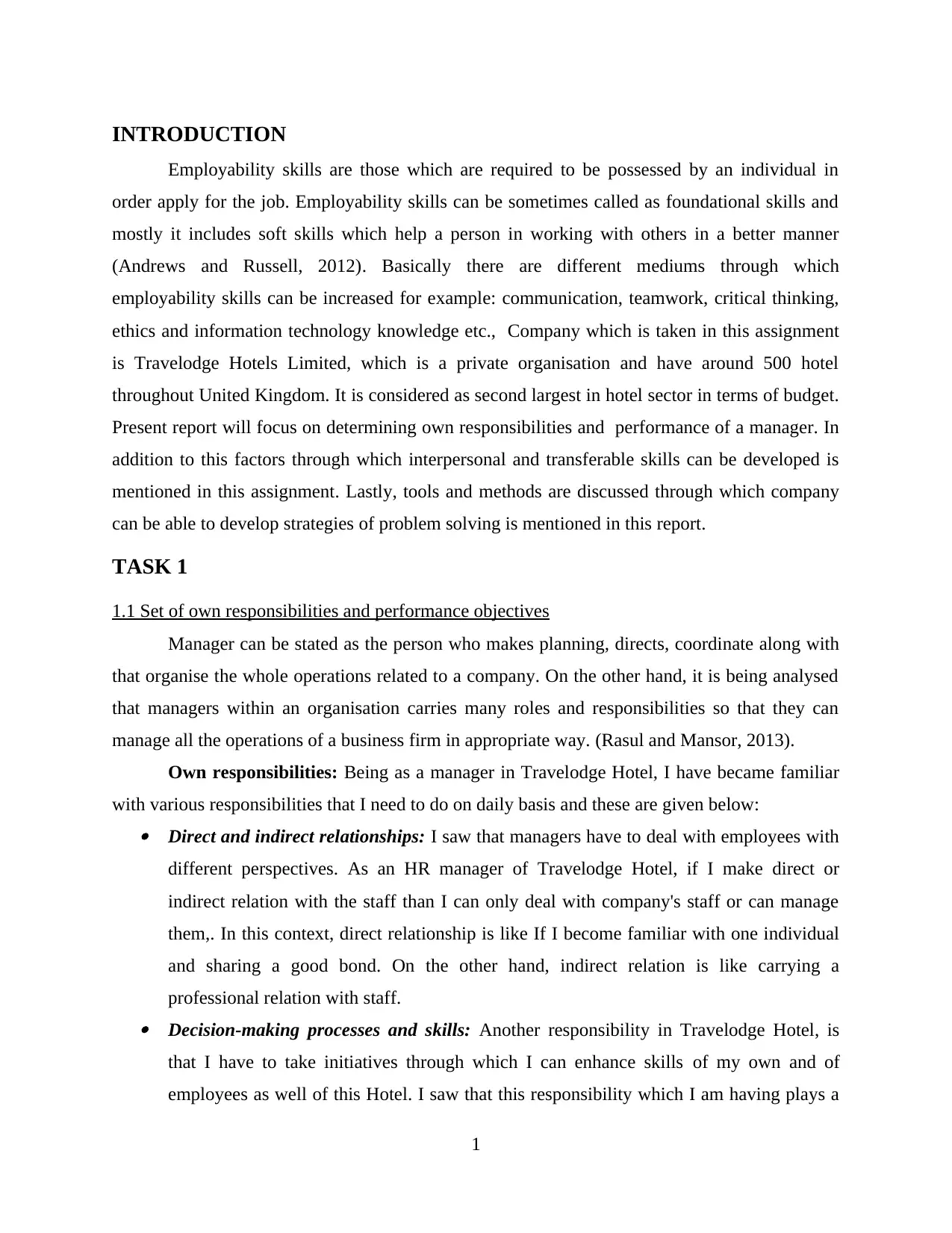
INTRODUCTION
Employability skills are those which are required to be possessed by an individual in
order apply for the job. Employability skills can be sometimes called as foundational skills and
mostly it includes soft skills which help a person in working with others in a better manner
(Andrews and Russell, 2012). Basically there are different mediums through which
employability skills can be increased for example: communication, teamwork, critical thinking,
ethics and information technology knowledge etc., Company which is taken in this assignment
is Travelodge Hotels Limited, which is a private organisation and have around 500 hotel
throughout United Kingdom. It is considered as second largest in hotel sector in terms of budget.
Present report will focus on determining own responsibilities and performance of a manager. In
addition to this factors through which interpersonal and transferable skills can be developed is
mentioned in this assignment. Lastly, tools and methods are discussed through which company
can be able to develop strategies of problem solving is mentioned in this report.
TASK 1
1.1 Set of own responsibilities and performance objectives
Manager can be stated as the person who makes planning, directs, coordinate along with
that organise the whole operations related to a company. On the other hand, it is being analysed
that managers within an organisation carries many roles and responsibilities so that they can
manage all the operations of a business firm in appropriate way. (Rasul and Mansor, 2013).
Own responsibilities: Being as a manager in Travelodge Hotel, I have became familiar
with various responsibilities that I need to do on daily basis and these are given below: Direct and indirect relationships: I saw that managers have to deal with employees with
different perspectives. As an HR manager of Travelodge Hotel, if I make direct or
indirect relation with the staff than I can only deal with company's staff or can manage
them,. In this context, direct relationship is like If I become familiar with one individual
and sharing a good bond. On the other hand, indirect relation is like carrying a
professional relation with staff. Decision-making processes and skills: Another responsibility in Travelodge Hotel, is
that I have to take initiatives through which I can enhance skills of my own and of
employees as well of this Hotel. I saw that this responsibility which I am having plays a
1
Employability skills are those which are required to be possessed by an individual in
order apply for the job. Employability skills can be sometimes called as foundational skills and
mostly it includes soft skills which help a person in working with others in a better manner
(Andrews and Russell, 2012). Basically there are different mediums through which
employability skills can be increased for example: communication, teamwork, critical thinking,
ethics and information technology knowledge etc., Company which is taken in this assignment
is Travelodge Hotels Limited, which is a private organisation and have around 500 hotel
throughout United Kingdom. It is considered as second largest in hotel sector in terms of budget.
Present report will focus on determining own responsibilities and performance of a manager. In
addition to this factors through which interpersonal and transferable skills can be developed is
mentioned in this assignment. Lastly, tools and methods are discussed through which company
can be able to develop strategies of problem solving is mentioned in this report.
TASK 1
1.1 Set of own responsibilities and performance objectives
Manager can be stated as the person who makes planning, directs, coordinate along with
that organise the whole operations related to a company. On the other hand, it is being analysed
that managers within an organisation carries many roles and responsibilities so that they can
manage all the operations of a business firm in appropriate way. (Rasul and Mansor, 2013).
Own responsibilities: Being as a manager in Travelodge Hotel, I have became familiar
with various responsibilities that I need to do on daily basis and these are given below: Direct and indirect relationships: I saw that managers have to deal with employees with
different perspectives. As an HR manager of Travelodge Hotel, if I make direct or
indirect relation with the staff than I can only deal with company's staff or can manage
them,. In this context, direct relationship is like If I become familiar with one individual
and sharing a good bond. On the other hand, indirect relation is like carrying a
professional relation with staff. Decision-making processes and skills: Another responsibility in Travelodge Hotel, is
that I have to take initiatives through which I can enhance skills of my own and of
employees as well of this Hotel. I saw that this responsibility which I am having plays a
1
Paraphrase This Document
Need a fresh take? Get an instant paraphrase of this document with our AI Paraphraser
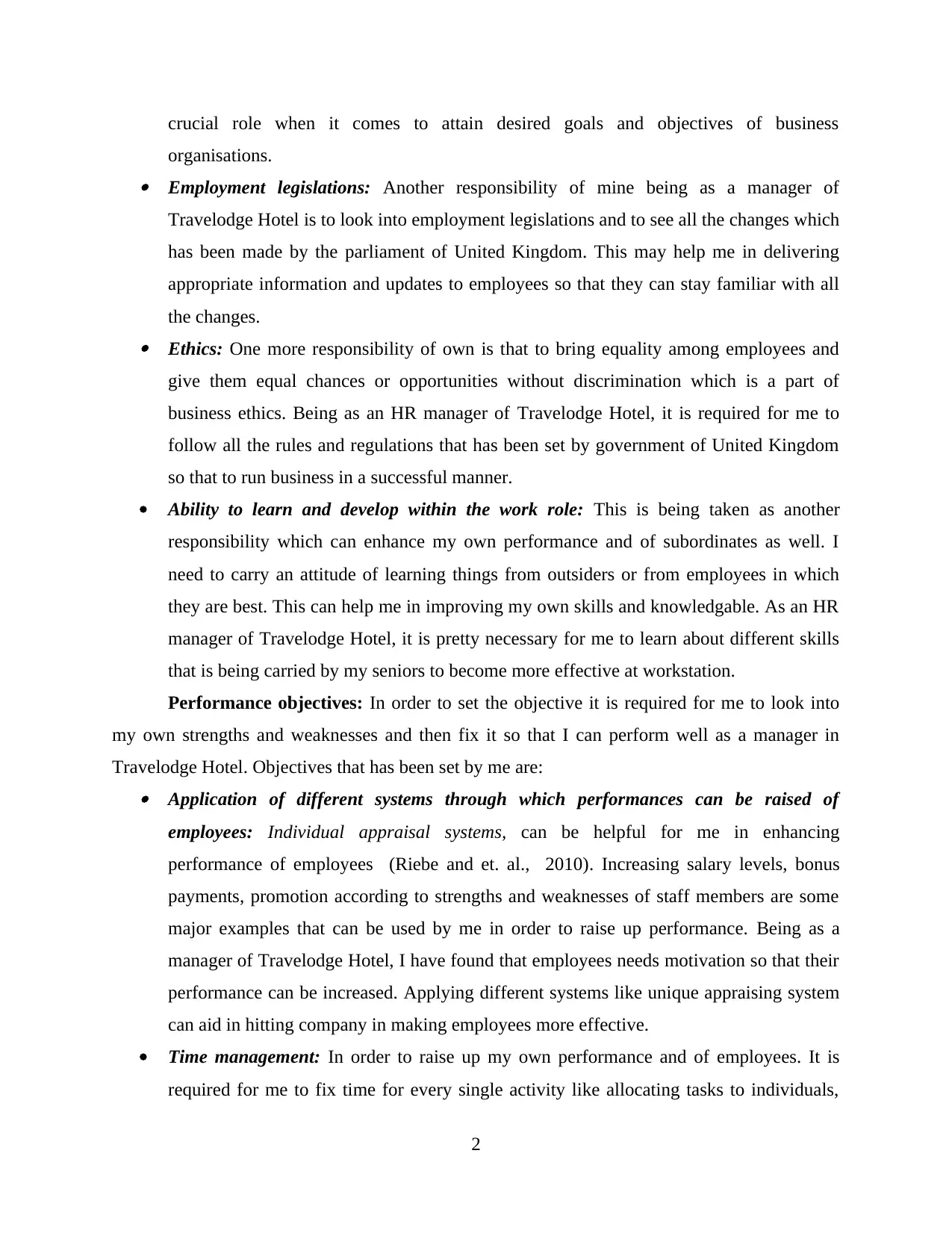
crucial role when it comes to attain desired goals and objectives of business
organisations. Employment legislations: Another responsibility of mine being as a manager of
Travelodge Hotel is to look into employment legislations and to see all the changes which
has been made by the parliament of United Kingdom. This may help me in delivering
appropriate information and updates to employees so that they can stay familiar with all
the changes. Ethics: One more responsibility of own is that to bring equality among employees and
give them equal chances or opportunities without discrimination which is a part of
business ethics. Being as an HR manager of Travelodge Hotel, it is required for me to
follow all the rules and regulations that has been set by government of United Kingdom
so that to run business in a successful manner.
Ability to learn and develop within the work role: This is being taken as another
responsibility which can enhance my own performance and of subordinates as well. I
need to carry an attitude of learning things from outsiders or from employees in which
they are best. This can help me in improving my own skills and knowledgable. As an HR
manager of Travelodge Hotel, it is pretty necessary for me to learn about different skills
that is being carried by my seniors to become more effective at workstation.
Performance objectives: In order to set the objective it is required for me to look into
my own strengths and weaknesses and then fix it so that I can perform well as a manager in
Travelodge Hotel. Objectives that has been set by me are: Application of different systems through which performances can be raised of
employees: Individual appraisal systems, can be helpful for me in enhancing
performance of employees (Riebe and et. al., 2010). Increasing salary levels, bonus
payments, promotion according to strengths and weaknesses of staff members are some
major examples that can be used by me in order to raise up performance. Being as a
manager of Travelodge Hotel, I have found that employees needs motivation so that their
performance can be increased. Applying different systems like unique appraising system
can aid in hitting company in making employees more effective.
Time management: In order to raise up my own performance and of employees. It is
required for me to fix time for every single activity like allocating tasks to individuals,
2
organisations. Employment legislations: Another responsibility of mine being as a manager of
Travelodge Hotel is to look into employment legislations and to see all the changes which
has been made by the parliament of United Kingdom. This may help me in delivering
appropriate information and updates to employees so that they can stay familiar with all
the changes. Ethics: One more responsibility of own is that to bring equality among employees and
give them equal chances or opportunities without discrimination which is a part of
business ethics. Being as an HR manager of Travelodge Hotel, it is required for me to
follow all the rules and regulations that has been set by government of United Kingdom
so that to run business in a successful manner.
Ability to learn and develop within the work role: This is being taken as another
responsibility which can enhance my own performance and of subordinates as well. I
need to carry an attitude of learning things from outsiders or from employees in which
they are best. This can help me in improving my own skills and knowledgable. As an HR
manager of Travelodge Hotel, it is pretty necessary for me to learn about different skills
that is being carried by my seniors to become more effective at workstation.
Performance objectives: In order to set the objective it is required for me to look into
my own strengths and weaknesses and then fix it so that I can perform well as a manager in
Travelodge Hotel. Objectives that has been set by me are: Application of different systems through which performances can be raised of
employees: Individual appraisal systems, can be helpful for me in enhancing
performance of employees (Riebe and et. al., 2010). Increasing salary levels, bonus
payments, promotion according to strengths and weaknesses of staff members are some
major examples that can be used by me in order to raise up performance. Being as a
manager of Travelodge Hotel, I have found that employees needs motivation so that their
performance can be increased. Applying different systems like unique appraising system
can aid in hitting company in making employees more effective.
Time management: In order to raise up my own performance and of employees. It is
required for me to fix time for every single activity like allocating tasks to individuals,
2
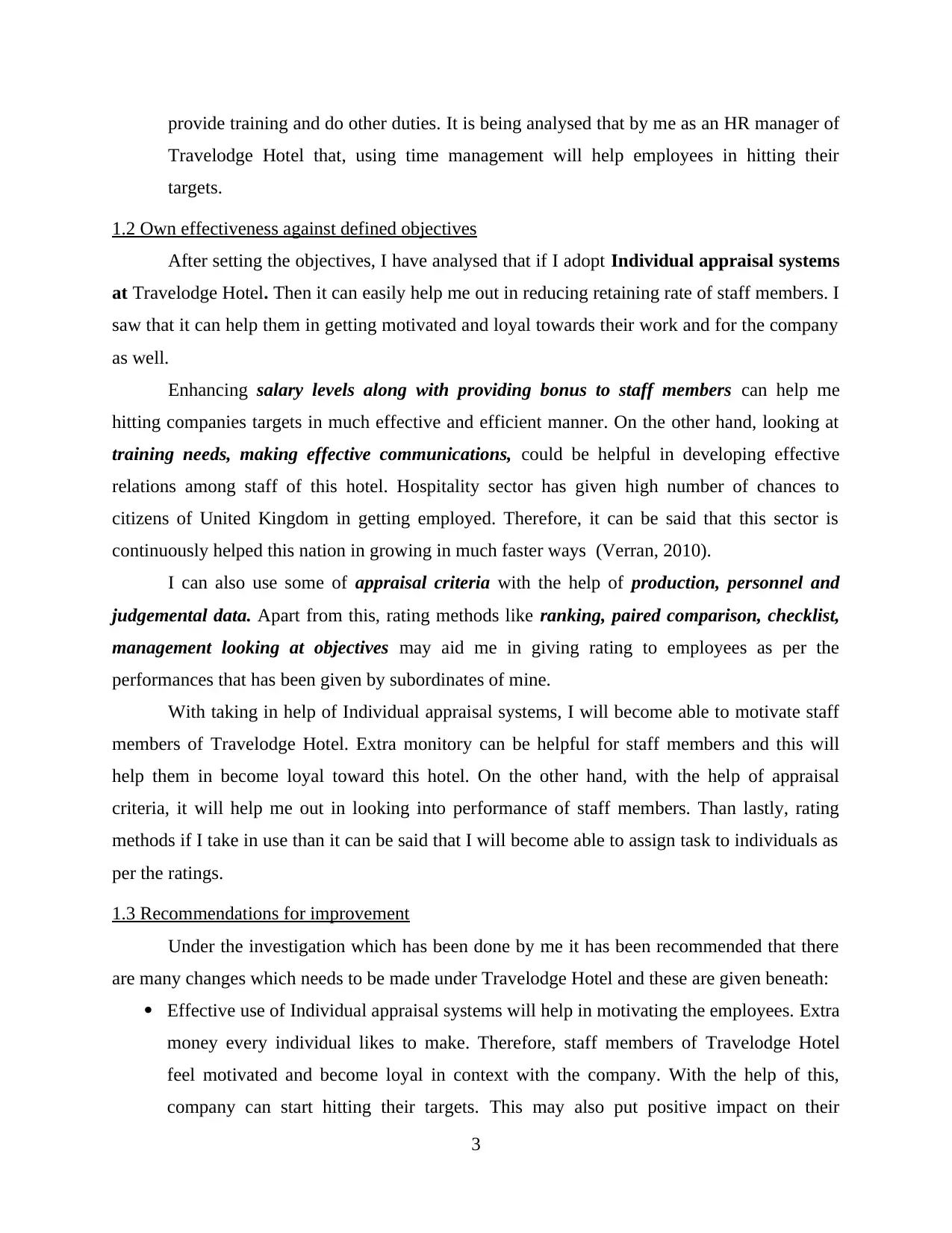
provide training and do other duties. It is being analysed that by me as an HR manager of
Travelodge Hotel that, using time management will help employees in hitting their
targets.
1.2 Own effectiveness against defined objectives
After setting the objectives, I have analysed that if I adopt Individual appraisal systems
at Travelodge Hotel. Then it can easily help me out in reducing retaining rate of staff members. I
saw that it can help them in getting motivated and loyal towards their work and for the company
as well.
Enhancing salary levels along with providing bonus to staff members can help me
hitting companies targets in much effective and efficient manner. On the other hand, looking at
training needs, making effective communications, could be helpful in developing effective
relations among staff of this hotel. Hospitality sector has given high number of chances to
citizens of United Kingdom in getting employed. Therefore, it can be said that this sector is
continuously helped this nation in growing in much faster ways (Verran, 2010).
I can also use some of appraisal criteria with the help of production, personnel and
judgemental data. Apart from this, rating methods like ranking, paired comparison, checklist,
management looking at objectives may aid me in giving rating to employees as per the
performances that has been given by subordinates of mine.
With taking in help of Individual appraisal systems, I will become able to motivate staff
members of Travelodge Hotel. Extra monitory can be helpful for staff members and this will
help them in become loyal toward this hotel. On the other hand, with the help of appraisal
criteria, it will help me out in looking into performance of staff members. Than lastly, rating
methods if I take in use than it can be said that I will become able to assign task to individuals as
per the ratings.
1.3 Recommendations for improvement
Under the investigation which has been done by me it has been recommended that there
are many changes which needs to be made under Travelodge Hotel and these are given beneath:
Effective use of Individual appraisal systems will help in motivating the employees. Extra
money every individual likes to make. Therefore, staff members of Travelodge Hotel
feel motivated and become loyal in context with the company. With the help of this,
company can start hitting their targets. This may also put positive impact on their
3
Travelodge Hotel that, using time management will help employees in hitting their
targets.
1.2 Own effectiveness against defined objectives
After setting the objectives, I have analysed that if I adopt Individual appraisal systems
at Travelodge Hotel. Then it can easily help me out in reducing retaining rate of staff members. I
saw that it can help them in getting motivated and loyal towards their work and for the company
as well.
Enhancing salary levels along with providing bonus to staff members can help me
hitting companies targets in much effective and efficient manner. On the other hand, looking at
training needs, making effective communications, could be helpful in developing effective
relations among staff of this hotel. Hospitality sector has given high number of chances to
citizens of United Kingdom in getting employed. Therefore, it can be said that this sector is
continuously helped this nation in growing in much faster ways (Verran, 2010).
I can also use some of appraisal criteria with the help of production, personnel and
judgemental data. Apart from this, rating methods like ranking, paired comparison, checklist,
management looking at objectives may aid me in giving rating to employees as per the
performances that has been given by subordinates of mine.
With taking in help of Individual appraisal systems, I will become able to motivate staff
members of Travelodge Hotel. Extra monitory can be helpful for staff members and this will
help them in become loyal toward this hotel. On the other hand, with the help of appraisal
criteria, it will help me out in looking into performance of staff members. Than lastly, rating
methods if I take in use than it can be said that I will become able to assign task to individuals as
per the ratings.
1.3 Recommendations for improvement
Under the investigation which has been done by me it has been recommended that there
are many changes which needs to be made under Travelodge Hotel and these are given beneath:
Effective use of Individual appraisal systems will help in motivating the employees. Extra
money every individual likes to make. Therefore, staff members of Travelodge Hotel
feel motivated and become loyal in context with the company. With the help of this,
company can start hitting their targets. This may also put positive impact on their
3
⊘ This is a preview!⊘
Do you want full access?
Subscribe today to unlock all pages.

Trusted by 1+ million students worldwide
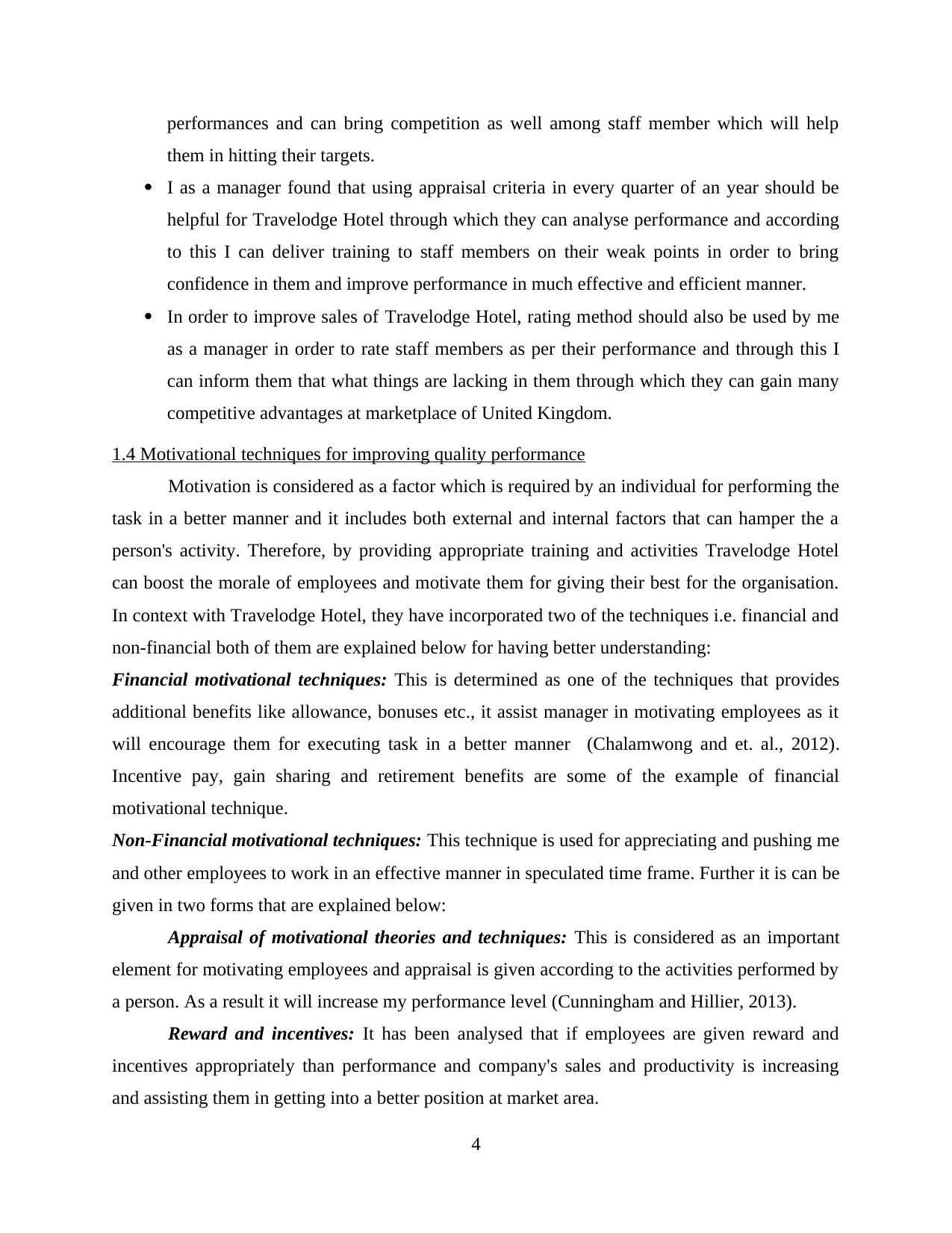
performances and can bring competition as well among staff member which will help
them in hitting their targets.
I as a manager found that using appraisal criteria in every quarter of an year should be
helpful for Travelodge Hotel through which they can analyse performance and according
to this I can deliver training to staff members on their weak points in order to bring
confidence in them and improve performance in much effective and efficient manner.
In order to improve sales of Travelodge Hotel, rating method should also be used by me
as a manager in order to rate staff members as per their performance and through this I
can inform them that what things are lacking in them through which they can gain many
competitive advantages at marketplace of United Kingdom.
1.4 Motivational techniques for improving quality performance
Motivation is considered as a factor which is required by an individual for performing the
task in a better manner and it includes both external and internal factors that can hamper the a
person's activity. Therefore, by providing appropriate training and activities Travelodge Hotel
can boost the morale of employees and motivate them for giving their best for the organisation.
In context with Travelodge Hotel, they have incorporated two of the techniques i.e. financial and
non-financial both of them are explained below for having better understanding:
Financial motivational techniques: This is determined as one of the techniques that provides
additional benefits like allowance, bonuses etc., it assist manager in motivating employees as it
will encourage them for executing task in a better manner (Chalamwong and et. al., 2012).
Incentive pay, gain sharing and retirement benefits are some of the example of financial
motivational technique.
Non-Financial motivational techniques: This technique is used for appreciating and pushing me
and other employees to work in an effective manner in speculated time frame. Further it is can be
given in two forms that are explained below:
Appraisal of motivational theories and techniques: This is considered as an important
element for motivating employees and appraisal is given according to the activities performed by
a person. As a result it will increase my performance level (Cunningham and Hillier, 2013).
Reward and incentives: It has been analysed that if employees are given reward and
incentives appropriately than performance and company's sales and productivity is increasing
and assisting them in getting into a better position at market area.
4
them in hitting their targets.
I as a manager found that using appraisal criteria in every quarter of an year should be
helpful for Travelodge Hotel through which they can analyse performance and according
to this I can deliver training to staff members on their weak points in order to bring
confidence in them and improve performance in much effective and efficient manner.
In order to improve sales of Travelodge Hotel, rating method should also be used by me
as a manager in order to rate staff members as per their performance and through this I
can inform them that what things are lacking in them through which they can gain many
competitive advantages at marketplace of United Kingdom.
1.4 Motivational techniques for improving quality performance
Motivation is considered as a factor which is required by an individual for performing the
task in a better manner and it includes both external and internal factors that can hamper the a
person's activity. Therefore, by providing appropriate training and activities Travelodge Hotel
can boost the morale of employees and motivate them for giving their best for the organisation.
In context with Travelodge Hotel, they have incorporated two of the techniques i.e. financial and
non-financial both of them are explained below for having better understanding:
Financial motivational techniques: This is determined as one of the techniques that provides
additional benefits like allowance, bonuses etc., it assist manager in motivating employees as it
will encourage them for executing task in a better manner (Chalamwong and et. al., 2012).
Incentive pay, gain sharing and retirement benefits are some of the example of financial
motivational technique.
Non-Financial motivational techniques: This technique is used for appreciating and pushing me
and other employees to work in an effective manner in speculated time frame. Further it is can be
given in two forms that are explained below:
Appraisal of motivational theories and techniques: This is considered as an important
element for motivating employees and appraisal is given according to the activities performed by
a person. As a result it will increase my performance level (Cunningham and Hillier, 2013).
Reward and incentives: It has been analysed that if employees are given reward and
incentives appropriately than performance and company's sales and productivity is increasing
and assisting them in getting into a better position at market area.
4
Paraphrase This Document
Need a fresh take? Get an instant paraphrase of this document with our AI Paraphraser
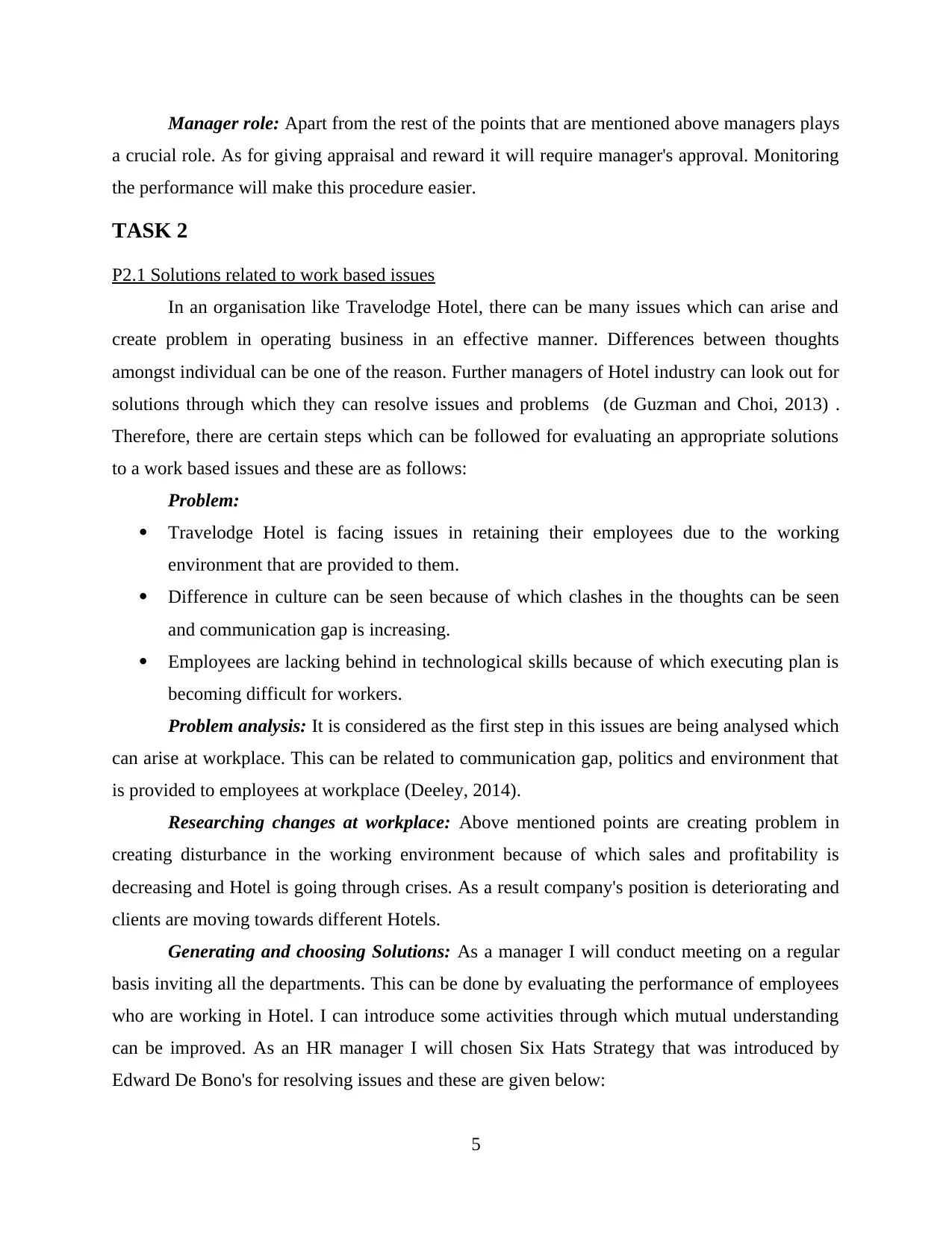
Manager role: Apart from the rest of the points that are mentioned above managers plays
a crucial role. As for giving appraisal and reward it will require manager's approval. Monitoring
the performance will make this procedure easier.
TASK 2
P2.1 Solutions related to work based issues
In an organisation like Travelodge Hotel, there can be many issues which can arise and
create problem in operating business in an effective manner. Differences between thoughts
amongst individual can be one of the reason. Further managers of Hotel industry can look out for
solutions through which they can resolve issues and problems (de Guzman and Choi, 2013) .
Therefore, there are certain steps which can be followed for evaluating an appropriate solutions
to a work based issues and these are as follows:
Problem:
Travelodge Hotel is facing issues in retaining their employees due to the working
environment that are provided to them.
Difference in culture can be seen because of which clashes in the thoughts can be seen
and communication gap is increasing.
Employees are lacking behind in technological skills because of which executing plan is
becoming difficult for workers.
Problem analysis: It is considered as the first step in this issues are being analysed which
can arise at workplace. This can be related to communication gap, politics and environment that
is provided to employees at workplace (Deeley, 2014).
Researching changes at workplace: Above mentioned points are creating problem in
creating disturbance in the working environment because of which sales and profitability is
decreasing and Hotel is going through crises. As a result company's position is deteriorating and
clients are moving towards different Hotels.
Generating and choosing Solutions: As a manager I will conduct meeting on a regular
basis inviting all the departments. This can be done by evaluating the performance of employees
who are working in Hotel. I can introduce some activities through which mutual understanding
can be improved. As an HR manager I will chosen Six Hats Strategy that was introduced by
Edward De Bono's for resolving issues and these are given below:
5
a crucial role. As for giving appraisal and reward it will require manager's approval. Monitoring
the performance will make this procedure easier.
TASK 2
P2.1 Solutions related to work based issues
In an organisation like Travelodge Hotel, there can be many issues which can arise and
create problem in operating business in an effective manner. Differences between thoughts
amongst individual can be one of the reason. Further managers of Hotel industry can look out for
solutions through which they can resolve issues and problems (de Guzman and Choi, 2013) .
Therefore, there are certain steps which can be followed for evaluating an appropriate solutions
to a work based issues and these are as follows:
Problem:
Travelodge Hotel is facing issues in retaining their employees due to the working
environment that are provided to them.
Difference in culture can be seen because of which clashes in the thoughts can be seen
and communication gap is increasing.
Employees are lacking behind in technological skills because of which executing plan is
becoming difficult for workers.
Problem analysis: It is considered as the first step in this issues are being analysed which
can arise at workplace. This can be related to communication gap, politics and environment that
is provided to employees at workplace (Deeley, 2014).
Researching changes at workplace: Above mentioned points are creating problem in
creating disturbance in the working environment because of which sales and profitability is
decreasing and Hotel is going through crises. As a result company's position is deteriorating and
clients are moving towards different Hotels.
Generating and choosing Solutions: As a manager I will conduct meeting on a regular
basis inviting all the departments. This can be done by evaluating the performance of employees
who are working in Hotel. I can introduce some activities through which mutual understanding
can be improved. As an HR manager I will chosen Six Hats Strategy that was introduced by
Edward De Bono's for resolving issues and these are given below:
5
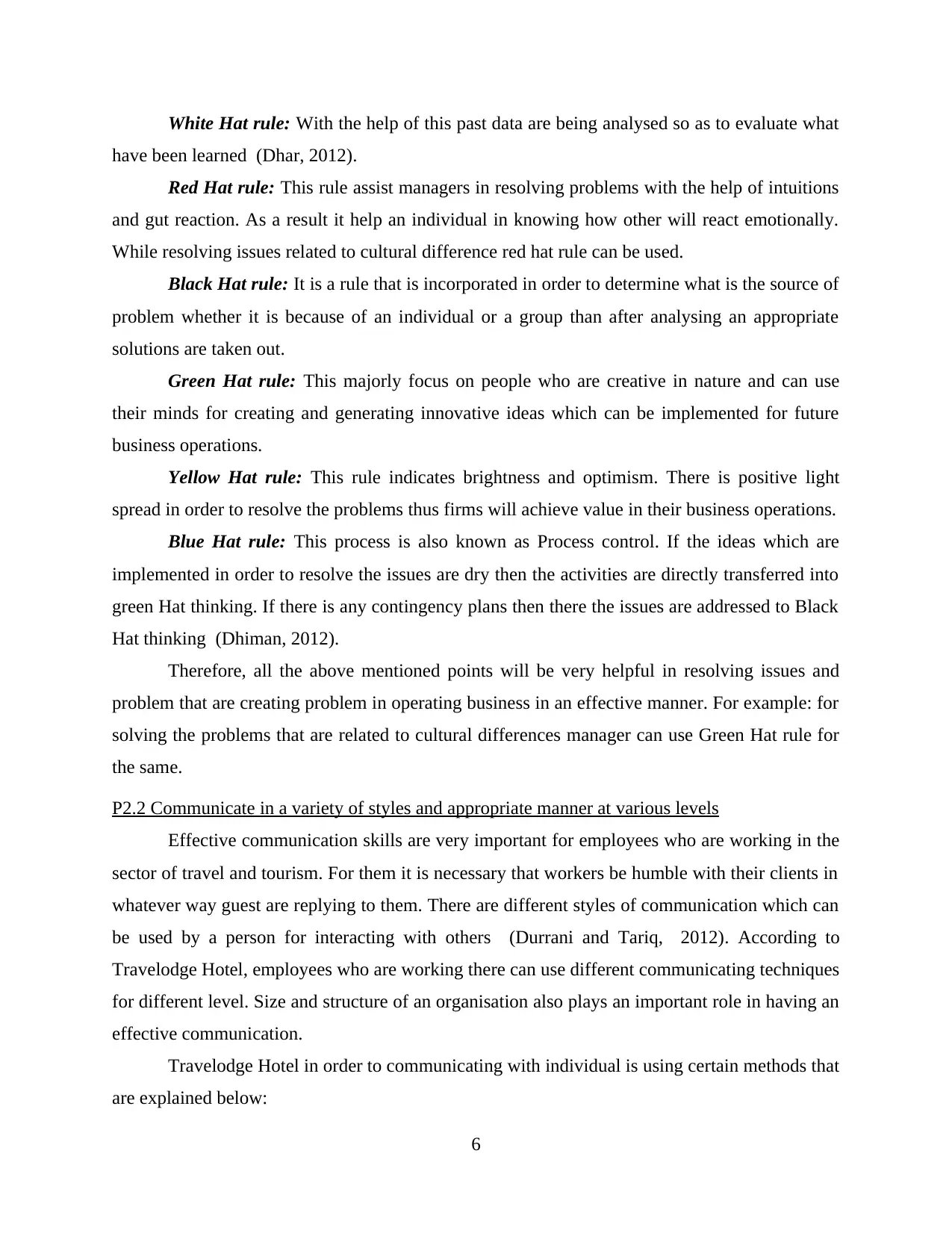
White Hat rule: With the help of this past data are being analysed so as to evaluate what
have been learned (Dhar, 2012).
Red Hat rule: This rule assist managers in resolving problems with the help of intuitions
and gut reaction. As a result it help an individual in knowing how other will react emotionally.
While resolving issues related to cultural difference red hat rule can be used.
Black Hat rule: It is a rule that is incorporated in order to determine what is the source of
problem whether it is because of an individual or a group than after analysing an appropriate
solutions are taken out.
Green Hat rule: This majorly focus on people who are creative in nature and can use
their minds for creating and generating innovative ideas which can be implemented for future
business operations.
Yellow Hat rule: This rule indicates brightness and optimism. There is positive light
spread in order to resolve the problems thus firms will achieve value in their business operations.
Blue Hat rule: This process is also known as Process control. If the ideas which are
implemented in order to resolve the issues are dry then the activities are directly transferred into
green Hat thinking. If there is any contingency plans then there the issues are addressed to Black
Hat thinking (Dhiman, 2012).
Therefore, all the above mentioned points will be very helpful in resolving issues and
problem that are creating problem in operating business in an effective manner. For example: for
solving the problems that are related to cultural differences manager can use Green Hat rule for
the same.
P2.2 Communicate in a variety of styles and appropriate manner at various levels
Effective communication skills are very important for employees who are working in the
sector of travel and tourism. For them it is necessary that workers be humble with their clients in
whatever way guest are replying to them. There are different styles of communication which can
be used by a person for interacting with others (Durrani and Tariq, 2012). According to
Travelodge Hotel, employees who are working there can use different communicating techniques
for different level. Size and structure of an organisation also plays an important role in having an
effective communication.
Travelodge Hotel in order to communicating with individual is using certain methods that
are explained below:
6
have been learned (Dhar, 2012).
Red Hat rule: This rule assist managers in resolving problems with the help of intuitions
and gut reaction. As a result it help an individual in knowing how other will react emotionally.
While resolving issues related to cultural difference red hat rule can be used.
Black Hat rule: It is a rule that is incorporated in order to determine what is the source of
problem whether it is because of an individual or a group than after analysing an appropriate
solutions are taken out.
Green Hat rule: This majorly focus on people who are creative in nature and can use
their minds for creating and generating innovative ideas which can be implemented for future
business operations.
Yellow Hat rule: This rule indicates brightness and optimism. There is positive light
spread in order to resolve the problems thus firms will achieve value in their business operations.
Blue Hat rule: This process is also known as Process control. If the ideas which are
implemented in order to resolve the issues are dry then the activities are directly transferred into
green Hat thinking. If there is any contingency plans then there the issues are addressed to Black
Hat thinking (Dhiman, 2012).
Therefore, all the above mentioned points will be very helpful in resolving issues and
problem that are creating problem in operating business in an effective manner. For example: for
solving the problems that are related to cultural differences manager can use Green Hat rule for
the same.
P2.2 Communicate in a variety of styles and appropriate manner at various levels
Effective communication skills are very important for employees who are working in the
sector of travel and tourism. For them it is necessary that workers be humble with their clients in
whatever way guest are replying to them. There are different styles of communication which can
be used by a person for interacting with others (Durrani and Tariq, 2012). According to
Travelodge Hotel, employees who are working there can use different communicating techniques
for different level. Size and structure of an organisation also plays an important role in having an
effective communication.
Travelodge Hotel in order to communicating with individual is using certain methods that
are explained below:
6
⊘ This is a preview!⊘
Do you want full access?
Subscribe today to unlock all pages.

Trusted by 1+ million students worldwide
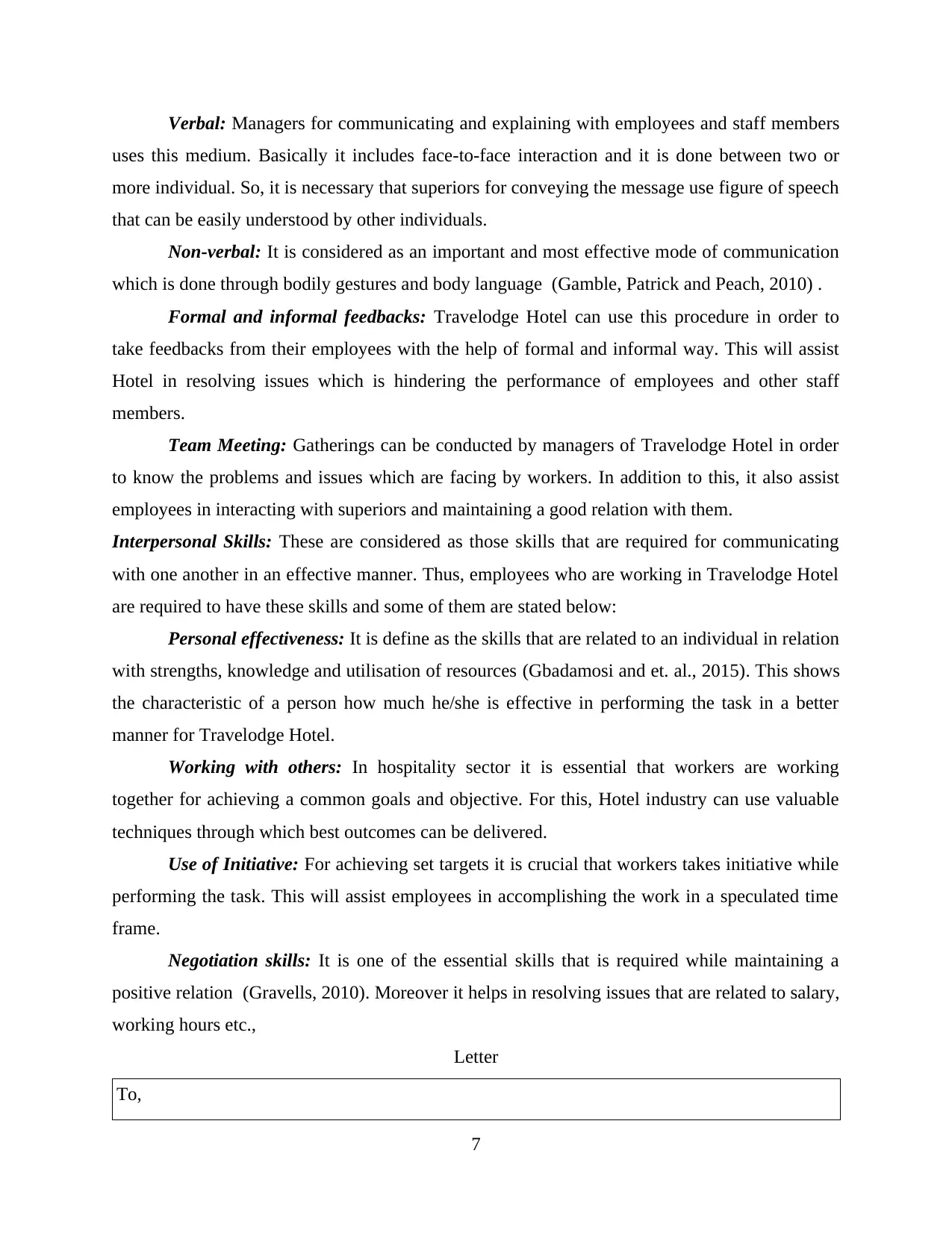
Verbal: Managers for communicating and explaining with employees and staff members
uses this medium. Basically it includes face-to-face interaction and it is done between two or
more individual. So, it is necessary that superiors for conveying the message use figure of speech
that can be easily understood by other individuals.
Non-verbal: It is considered as an important and most effective mode of communication
which is done through bodily gestures and body language (Gamble, Patrick and Peach, 2010) .
Formal and informal feedbacks: Travelodge Hotel can use this procedure in order to
take feedbacks from their employees with the help of formal and informal way. This will assist
Hotel in resolving issues which is hindering the performance of employees and other staff
members.
Team Meeting: Gatherings can be conducted by managers of Travelodge Hotel in order
to know the problems and issues which are facing by workers. In addition to this, it also assist
employees in interacting with superiors and maintaining a good relation with them.
Interpersonal Skills: These are considered as those skills that are required for communicating
with one another in an effective manner. Thus, employees who are working in Travelodge Hotel
are required to have these skills and some of them are stated below:
Personal effectiveness: It is define as the skills that are related to an individual in relation
with strengths, knowledge and utilisation of resources (Gbadamosi and et. al., 2015). This shows
the characteristic of a person how much he/she is effective in performing the task in a better
manner for Travelodge Hotel.
Working with others: In hospitality sector it is essential that workers are working
together for achieving a common goals and objective. For this, Hotel industry can use valuable
techniques through which best outcomes can be delivered.
Use of Initiative: For achieving set targets it is crucial that workers takes initiative while
performing the task. This will assist employees in accomplishing the work in a speculated time
frame.
Negotiation skills: It is one of the essential skills that is required while maintaining a
positive relation (Gravells, 2010). Moreover it helps in resolving issues that are related to salary,
working hours etc.,
Letter
To,
7
uses this medium. Basically it includes face-to-face interaction and it is done between two or
more individual. So, it is necessary that superiors for conveying the message use figure of speech
that can be easily understood by other individuals.
Non-verbal: It is considered as an important and most effective mode of communication
which is done through bodily gestures and body language (Gamble, Patrick and Peach, 2010) .
Formal and informal feedbacks: Travelodge Hotel can use this procedure in order to
take feedbacks from their employees with the help of formal and informal way. This will assist
Hotel in resolving issues which is hindering the performance of employees and other staff
members.
Team Meeting: Gatherings can be conducted by managers of Travelodge Hotel in order
to know the problems and issues which are facing by workers. In addition to this, it also assist
employees in interacting with superiors and maintaining a good relation with them.
Interpersonal Skills: These are considered as those skills that are required for communicating
with one another in an effective manner. Thus, employees who are working in Travelodge Hotel
are required to have these skills and some of them are stated below:
Personal effectiveness: It is define as the skills that are related to an individual in relation
with strengths, knowledge and utilisation of resources (Gbadamosi and et. al., 2015). This shows
the characteristic of a person how much he/she is effective in performing the task in a better
manner for Travelodge Hotel.
Working with others: In hospitality sector it is essential that workers are working
together for achieving a common goals and objective. For this, Hotel industry can use valuable
techniques through which best outcomes can be delivered.
Use of Initiative: For achieving set targets it is crucial that workers takes initiative while
performing the task. This will assist employees in accomplishing the work in a speculated time
frame.
Negotiation skills: It is one of the essential skills that is required while maintaining a
positive relation (Gravells, 2010). Moreover it helps in resolving issues that are related to salary,
working hours etc.,
Letter
To,
7
Paraphrase This Document
Need a fresh take? Get an instant paraphrase of this document with our AI Paraphraser
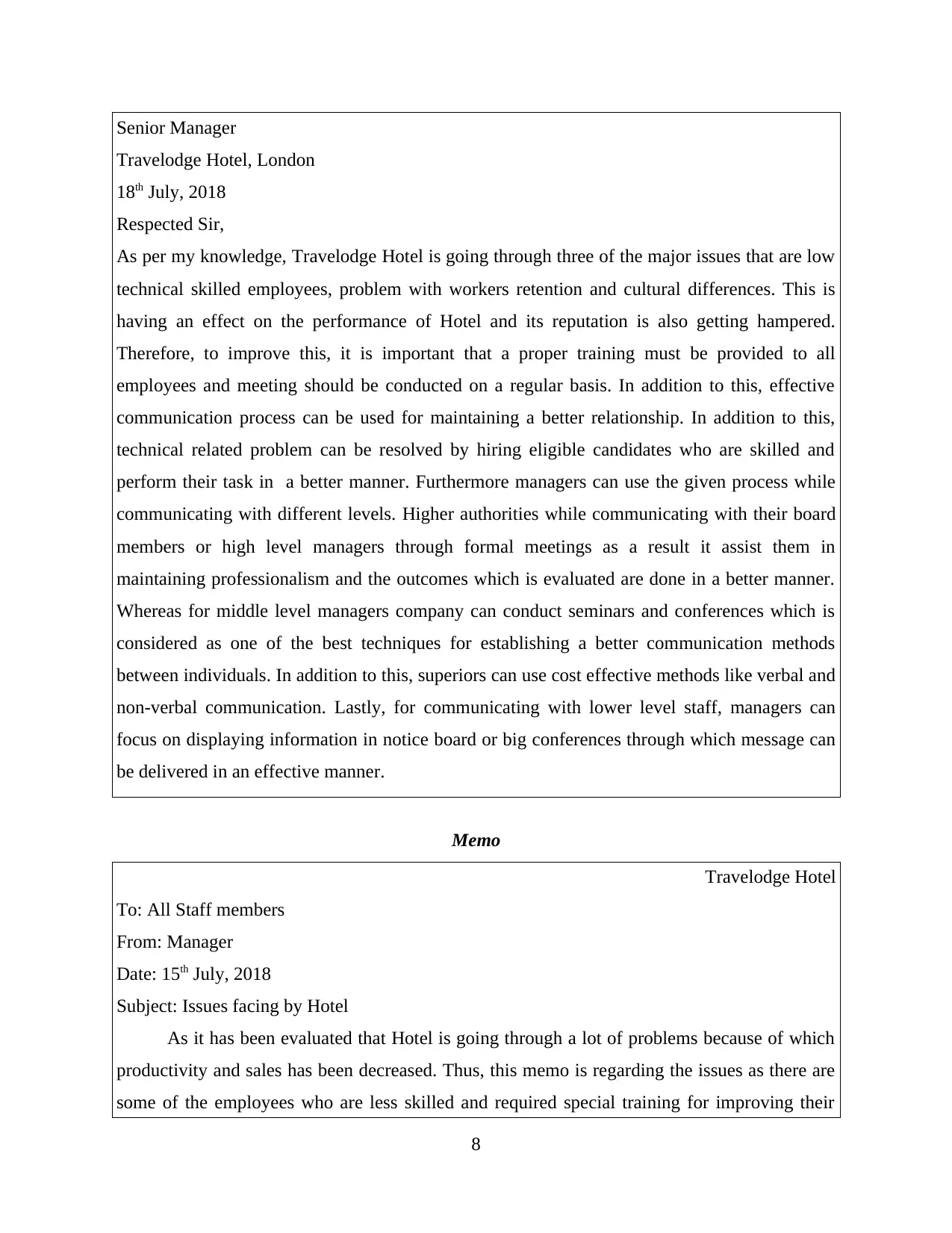
Senior Manager
Travelodge Hotel, London
18th July, 2018
Respected Sir,
As per my knowledge, Travelodge Hotel is going through three of the major issues that are low
technical skilled employees, problem with workers retention and cultural differences. This is
having an effect on the performance of Hotel and its reputation is also getting hampered.
Therefore, to improve this, it is important that a proper training must be provided to all
employees and meeting should be conducted on a regular basis. In addition to this, effective
communication process can be used for maintaining a better relationship. In addition to this,
technical related problem can be resolved by hiring eligible candidates who are skilled and
perform their task in a better manner. Furthermore managers can use the given process while
communicating with different levels. Higher authorities while communicating with their board
members or high level managers through formal meetings as a result it assist them in
maintaining professionalism and the outcomes which is evaluated are done in a better manner.
Whereas for middle level managers company can conduct seminars and conferences which is
considered as one of the best techniques for establishing a better communication methods
between individuals. In addition to this, superiors can use cost effective methods like verbal and
non-verbal communication. Lastly, for communicating with lower level staff, managers can
focus on displaying information in notice board or big conferences through which message can
be delivered in an effective manner.
Memo
Travelodge Hotel
To: All Staff members
From: Manager
Date: 15th July, 2018
Subject: Issues facing by Hotel
As it has been evaluated that Hotel is going through a lot of problems because of which
productivity and sales has been decreased. Thus, this memo is regarding the issues as there are
some of the employees who are less skilled and required special training for improving their
8
Travelodge Hotel, London
18th July, 2018
Respected Sir,
As per my knowledge, Travelodge Hotel is going through three of the major issues that are low
technical skilled employees, problem with workers retention and cultural differences. This is
having an effect on the performance of Hotel and its reputation is also getting hampered.
Therefore, to improve this, it is important that a proper training must be provided to all
employees and meeting should be conducted on a regular basis. In addition to this, effective
communication process can be used for maintaining a better relationship. In addition to this,
technical related problem can be resolved by hiring eligible candidates who are skilled and
perform their task in a better manner. Furthermore managers can use the given process while
communicating with different levels. Higher authorities while communicating with their board
members or high level managers through formal meetings as a result it assist them in
maintaining professionalism and the outcomes which is evaluated are done in a better manner.
Whereas for middle level managers company can conduct seminars and conferences which is
considered as one of the best techniques for establishing a better communication methods
between individuals. In addition to this, superiors can use cost effective methods like verbal and
non-verbal communication. Lastly, for communicating with lower level staff, managers can
focus on displaying information in notice board or big conferences through which message can
be delivered in an effective manner.
Memo
Travelodge Hotel
To: All Staff members
From: Manager
Date: 15th July, 2018
Subject: Issues facing by Hotel
As it has been evaluated that Hotel is going through a lot of problems because of which
productivity and sales has been decreased. Thus, this memo is regarding the issues as there are
some of the employees who are less skilled and required special training for improving their
8
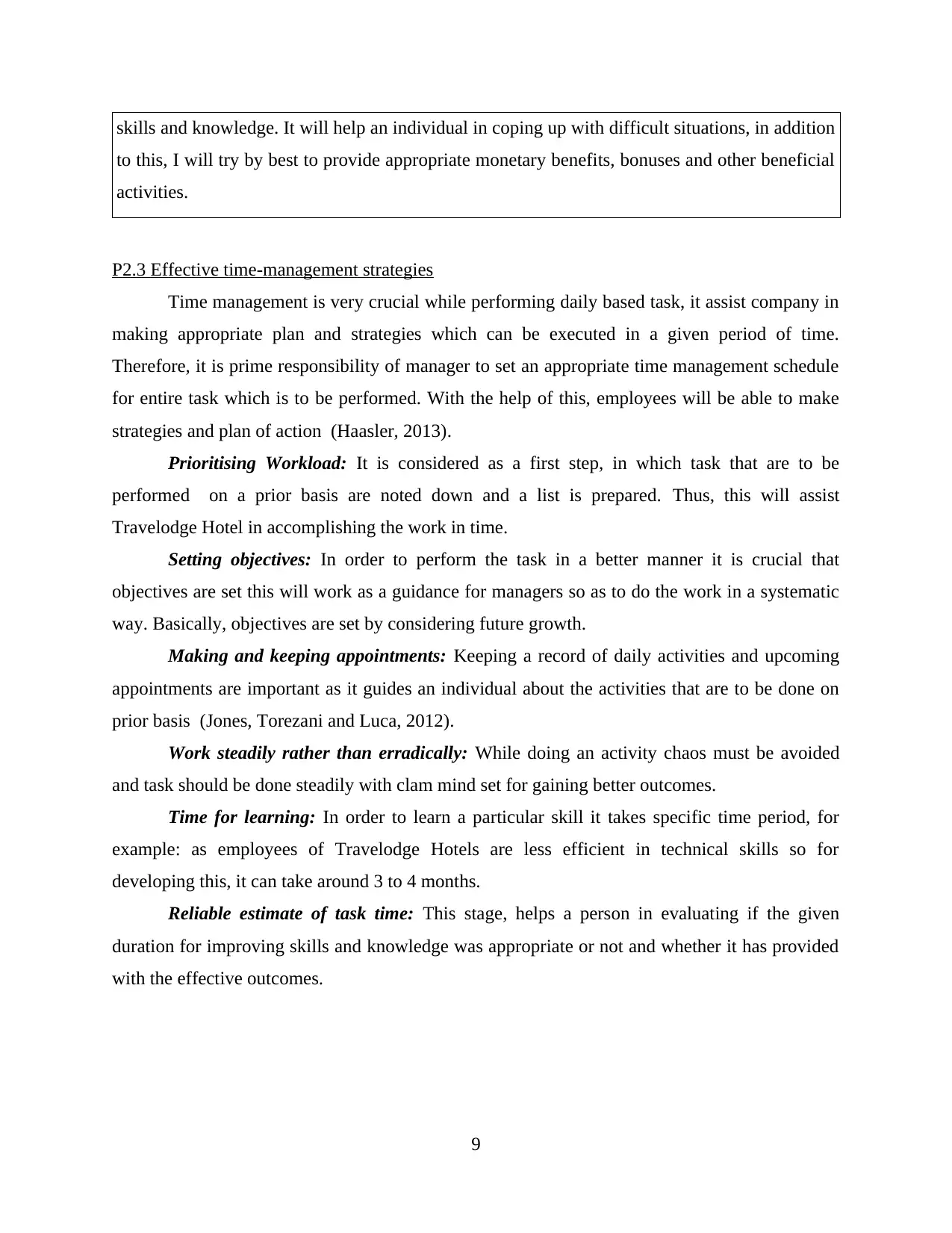
skills and knowledge. It will help an individual in coping up with difficult situations, in addition
to this, I will try by best to provide appropriate monetary benefits, bonuses and other beneficial
activities.
P2.3 Effective time-management strategies
Time management is very crucial while performing daily based task, it assist company in
making appropriate plan and strategies which can be executed in a given period of time.
Therefore, it is prime responsibility of manager to set an appropriate time management schedule
for entire task which is to be performed. With the help of this, employees will be able to make
strategies and plan of action (Haasler, 2013).
Prioritising Workload: It is considered as a first step, in which task that are to be
performed on a prior basis are noted down and a list is prepared. Thus, this will assist
Travelodge Hotel in accomplishing the work in time.
Setting objectives: In order to perform the task in a better manner it is crucial that
objectives are set this will work as a guidance for managers so as to do the work in a systematic
way. Basically, objectives are set by considering future growth.
Making and keeping appointments: Keeping a record of daily activities and upcoming
appointments are important as it guides an individual about the activities that are to be done on
prior basis (Jones, Torezani and Luca, 2012).
Work steadily rather than erradically: While doing an activity chaos must be avoided
and task should be done steadily with clam mind set for gaining better outcomes.
Time for learning: In order to learn a particular skill it takes specific time period, for
example: as employees of Travelodge Hotels are less efficient in technical skills so for
developing this, it can take around 3 to 4 months.
Reliable estimate of task time: This stage, helps a person in evaluating if the given
duration for improving skills and knowledge was appropriate or not and whether it has provided
with the effective outcomes.
9
to this, I will try by best to provide appropriate monetary benefits, bonuses and other beneficial
activities.
P2.3 Effective time-management strategies
Time management is very crucial while performing daily based task, it assist company in
making appropriate plan and strategies which can be executed in a given period of time.
Therefore, it is prime responsibility of manager to set an appropriate time management schedule
for entire task which is to be performed. With the help of this, employees will be able to make
strategies and plan of action (Haasler, 2013).
Prioritising Workload: It is considered as a first step, in which task that are to be
performed on a prior basis are noted down and a list is prepared. Thus, this will assist
Travelodge Hotel in accomplishing the work in time.
Setting objectives: In order to perform the task in a better manner it is crucial that
objectives are set this will work as a guidance for managers so as to do the work in a systematic
way. Basically, objectives are set by considering future growth.
Making and keeping appointments: Keeping a record of daily activities and upcoming
appointments are important as it guides an individual about the activities that are to be done on
prior basis (Jones, Torezani and Luca, 2012).
Work steadily rather than erradically: While doing an activity chaos must be avoided
and task should be done steadily with clam mind set for gaining better outcomes.
Time for learning: In order to learn a particular skill it takes specific time period, for
example: as employees of Travelodge Hotels are less efficient in technical skills so for
developing this, it can take around 3 to 4 months.
Reliable estimate of task time: This stage, helps a person in evaluating if the given
duration for improving skills and knowledge was appropriate or not and whether it has provided
with the effective outcomes.
9
⊘ This is a preview!⊘
Do you want full access?
Subscribe today to unlock all pages.

Trusted by 1+ million students worldwide
1 out of 19
Related Documents
Your All-in-One AI-Powered Toolkit for Academic Success.
+13062052269
info@desklib.com
Available 24*7 on WhatsApp / Email
![[object Object]](/_next/static/media/star-bottom.7253800d.svg)
Unlock your academic potential
Copyright © 2020–2025 A2Z Services. All Rights Reserved. Developed and managed by ZUCOL.




